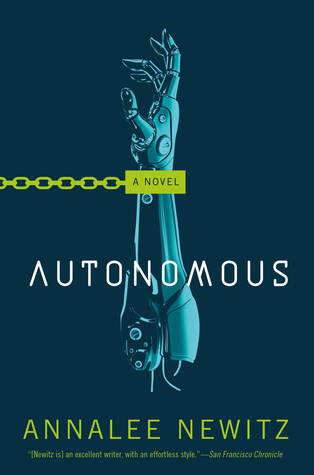My rating: 3 of 5 stars
Future slavery gets around slavery laws by cleverly using a different word.
Jack reverse engineers pharmaceuticals so that poor people can afford life-saving drugs. She reverse engineered a new wonder work drug but finds out too late that a BigPharma company made it 100% addictive, and now people are dying. In this (dystopian) future, intellectual property and patents are protected by private armies with killer robots. One agent and his bot, Eliasz and Paladin, are hunting Jack down for her crimes as she is desperately trying to engineer a treatment for the addictive drug.
This book was difficult to review. As a novel, the writing, plotting, characters, and themes are all interesting and well done. On that basis, it is a solid 4-star book. But there was quite a bit about the premise and key plot devices/points that had me making squinty faces as my scepticism was triggered. And the more I think about those points and the premise, the more flaws I see with them.
For example, slavery is a theme discussed for humans and bots – giving rise to the title of the book. In the future companies and governments were so clever they were able to reintroduce* slavery by calling it “indentured”. This felt lazy and unrealistic. Especially since there was another part of this idea explored with franchising – parents paying to set their kids up with an education and ability to get a job – that extrapolates on the current situation for haves vs have-nots and draws upon the criticisms of capitalism. To my mind, the two ideas don’t sit together that well and meant the latter idea was wasted.
Others had some interesting things to say about the bot-human relationship. Suffice to say, it could have been done a bit better.
I suppose I was disappointed with this book. For a novel that was so well written and had clearly had a lot of thought put into it, Autonomous just couldn’t manage to drag itself away from lazy anti-corporate conspiracy ideas to the more interesting material it had on offer.
*It could be argued that slavery never stopped.


It’s true that slavery has never stopped. In some ways, it’s evolved. I’m working on a couple of short stories in which slavery has become a legal part of society through a process of political bargaining and economic justification. Name change can go only so far.
LikeLiked by 1 person
Are they spec-fic or just near future crime?
I can’t remember if human trafficking for slavery was the second or third most lucrative illegal activity. Drugs was obviously the biggest, then either slavery or guns. We don’t think about it, but we all benefit from it.
LikeLike
Both stories (if I ever finish them) are science fiction. They’ll incorporate climate change as one of the factors in bringing about legal slavery, but it will stay in the background.
Good point, that we all benefit by slavery, whether we’re aware of it or not. It’s more invisible than guns and drugs, but that’s changing lately. I suspect that bringing it out into the open isn’t going to do much good.
LikeLiked by 1 person